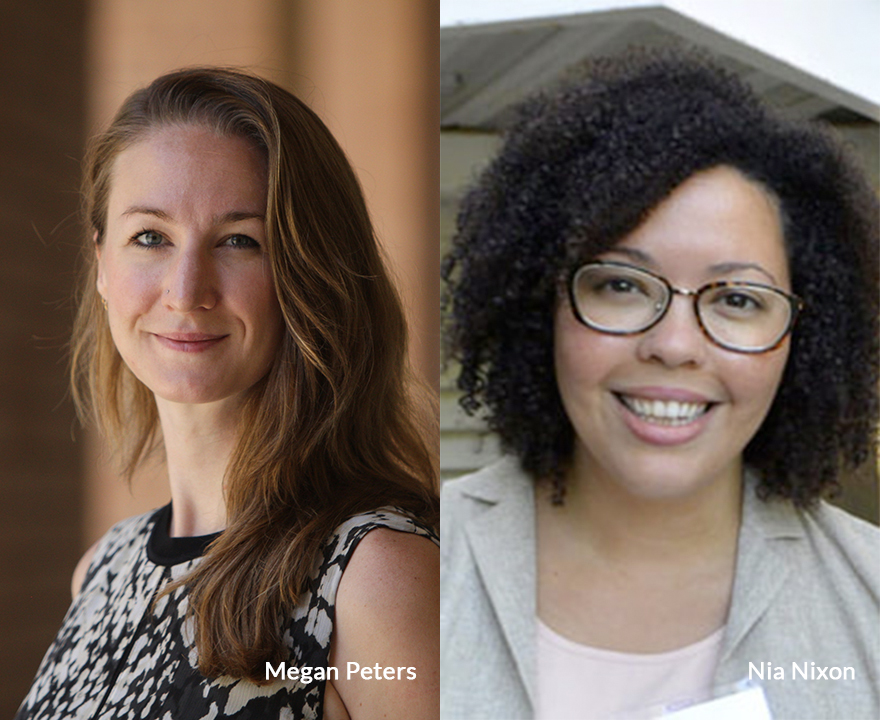UCI researchers part of $17 million NIH grant to reverse science’s “replication crisis”

UCI researchers part of $17 million NIH grant to reverse science’s “replication crisis”
- March 24, 2023
- Cognitive scientists Megan Peters and Nia Nixon are helping develop an online educational platform for researchers
-----
Researchers call it the “replication crisis,” and it’s chipping away at the public’s trust in science: the fact that surprisingly few studies can be repeated with the same results. Now, UCI researchers are part of a $17 million grant from the National Institutes of Health aimed at solving the problem.
Their approach is anything but textbook. UCI cognitive scientists Nia Nixon (née Dowell) and Megan Peters are helping build an open-source, collaborative online platform that will teach future scientists how to run rigorous, replicable experiments.
“Science has a real problem with replication that continues to snowball,” said Peters, assistant professor of cognitive sciences in the School of Social Sciences. “The NIH is focusing money and resources to develop systems and educational practices that promote good science – which is one of the most important tools we as a society have in discovering the truth.”
The NIH-funded Creating an Educational Nexus for Training in Experimental Rigor, or CENTER, is led by Konrad Kording, professor of neuroscience at the University of Pennsylvania, and brings together researchers from a number of institutions including UCI, Johns Hopkins University, Indiana University and Georgia Institute of Technology. The project kicked off in 2022, and UCI’s portion of the 5-year grant is $275,000.
“Our goal is to produce a dynamic, future-proof curriculum that can be updated and customized for researchers at different levels, from undergraduate to post-doctoral,” said Peters, who expects to use the finished product to teach graduate students in her own lab.
Best practices for running high-quality, replicable experiments are already taught at research institutions, but not always in a systematic way. It’s often up to individual researchers to educate the graduate student researchers working in their labs, or the principles are one piece incorporated into a broader course like research ethics.
As a member of the CENTER advisory board, Peters will leverage her experiences and lessons-learned from building another online platform, Neuromatch, which has taught computational techniques to 8,000 students and researchers since the beginning of the COVID-19 pandemic. Peters will help coordinate the teams of researchers who are creating the course content with funding from another NIH program called Materials to Enhance Training in Experimental Rigor, or METER.
“Our role at CENTER is to create the infrastructure that aggregates these beautiful materials developed through the METER grants, and make them feel uniform and user-friendly,” said Peters. “While at the same time, we are actively engaging the community of scientists and researchers to ensure this is a collaborative endeavor.”
The advisory board first met in person with the METER grant teams in fall 2022, and they are now collaborating virtually from each of their institutions.
Nixon, assistant professor of education and director of the Language and Learning Analytics (LaLA) lab, will bring expertise in online collaboration and communication to evaluate the effectiveness of the online curriculum – not just in terms of what it is teaching, but also the social and psychological experience of its users.
“We’re trying to understand how the dynamics of human interaction and communication manifest in an online learning context, and how that affects learning of the content itself,” said Nixon. “This is increasingly important now that online learning is the new normal.”
For example, Nixon will look at how people feel during the online learning process – their sense of belonging and self-efficacy – and how they signal those feelings in a digital environment. Then, how those feelings impact how well they learn the content that’s being presented. Previous research has found that women and men can experience their online collaborations differently, with women more likely to feel that their contributions are overlooked.
“This is a new frontier, and an exciting opportunity to better understand communication and learning behavior in online learning, and to look at issues of inclusion and equity in the space,” said Nixon.
The process CENTER follows in creating the curriculum for experimental rigor, and evaluating its efficacy, will be carefully documented, in hopes that the learnings can be applied to other open-source platforms that solve educational challenges in topics beyond experimental rigor.
-Christine Byrd for UCI
-----
Would you like to get more involved with the social sciences? Email us at communications@socsci.uci.edu to connect.
Share on:
Related News Items
- Careet RightWhat would it take to convince a neuroscientist that an AI is conscious?
- Careet RightResearch team earns best article award from Psychonomic Society
- Careet RightHow to develop good research questions
- Careet RightThinking about neuroscience: Essays from the field
- Careet RightAt the credit crossroads: Modern neuroscience needs a cultural shift to adopt new authorship practices


